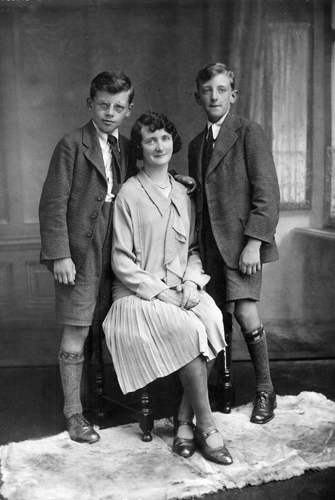A brief history of the Squire family and village life in Broadwoodwidger
by Alison Barriball (née Squire)
The surname of Squire has strong connections to Broadwoodwidger going back to the 18th century if not earlier. My great-great-great grandfather, John Squire, was born in the village in c. 1810. A Directory in 1850 records him as a shopkeeper, but, in the 1851 Census, he called himself a carpenter and he had two carpenter’s apprentices living with him, as well as his wife, Sophia (born in Ashwater) and five children – Mary (14), Thomas (10) (my great-great grandfather), William (8), John (2) and Elizabeth (ten months). Sophia, though, died on 18th April 1865, aged 53. By 1866, John also labelled himself a builder.
My great grandparents Thomas and Elizabeth Squire (née Guscott) of ‘Arracott’, Stowford were married at Stowford Church in 1869. They moved to ‘Hillview’ in Broadwoodwidger where Thomas had a carpentry and undertakers business. They had a pitsaw in the village used to saw their own timber for coffins and furniture etc. The carpenters shop is still standing and used today as a workshop belonging to ‘The Old Post Office’. There is a row of cottages in Princetown village, which were built by the Squire family builders.
In 1882, Thomas took on the role as Postmaster in the village.
Thomas and Elizabeth had five sons. John who farmed at Higher Rexon, Frank, Harold who moved to New Zealand, William who moved to Birmingham, and Thomas, my granddad. Thomas married Olive (née Littlejohns) and they lived at ‘Hillview’ and took over the running of the Post Office. They had two sons Harold, my father, and Edward, my uncle. Harold and Edward went to School at Thorncross, walking across the fields with the other local children from the Rich and Northey families.
Sadly, my grandad, Thomas, caught pneumonia and died aged 43 years, leaving Olive to bring up two small boys alone, which was very tough back in those days. Olive decided to move with the boys from ‘Hillview’ to ‘The Greenhouse’ (now known as ‘The Old Post Office’) from which she ran the Post Office and also had a smallholding. Edward went on to become a farmer and Harold became the village postman.
In 1951, Olive passed away suddenly at the age of 59. Quite soon after, my parents, Harold and Myrtle (née Veale) of ‘Cross Park’, Virginstowe, decided to get married and my mother took on the running of the Post Office with immediate effect, not even having time for a honeymoon. They went on to have one daughter (me).
My mother, Myrtle, was Postmistress in Broadwoodwidger for nearly 50 years and the Post Office was run by the Squire family for 100 years. It was a busy office, with four postmen working from it at one time all doing local rounds. Bill Worden used to ride his bicycle to Lifton and collect all the mail and bring it back to Broadwoodwidger to be sorted. Douglas Parsons, Jack Ward and Harold Squire were the other postmen. My father, Harold, used to ride his bicycle delivering post and, in later years, was allowed to drive his car around. I used to go with him occasionally, which I really enjoyed.
Christmas was a very busy time of year for my mother, as she would help customers post their many parcels and cards.
Village life was very special back then.
Mr and Mrs Ernest Martin who resided at ‘Hillview’ ran a Tailors shop. I used to love going across there, as Mr Martin had a treadle sewing machine and would let me look at all the materials which he kept in a huge chest of drawers.
There was a Blacksmiths shop at the top of the village green.
Walter Down and his two sisters, Ena and Lorna, of ‘Church House’ ran a small shop selling sweets and a few groceries. The shop was always kept locked, so customers would have to knock loudly and wait a while for it to be opened.
We used to buy most of our groceries from Moons shop at Ashmill. Mr May would come and take the order and, later on in the week, it would be delivered all boxed up and arrive on a small lorry. Bags of coal would be delivered at the same time. My parents kept a few cows which they milked by hand. The churns of milk would be labelled and put out by the road ready to be collected and taken to Ambrosia milk factory at Lifton.
Another branch of the Squire family ran the Hare and Hounds Inn (now known as ‘Church House’) – see Broadwoodwidger Public Houses.
